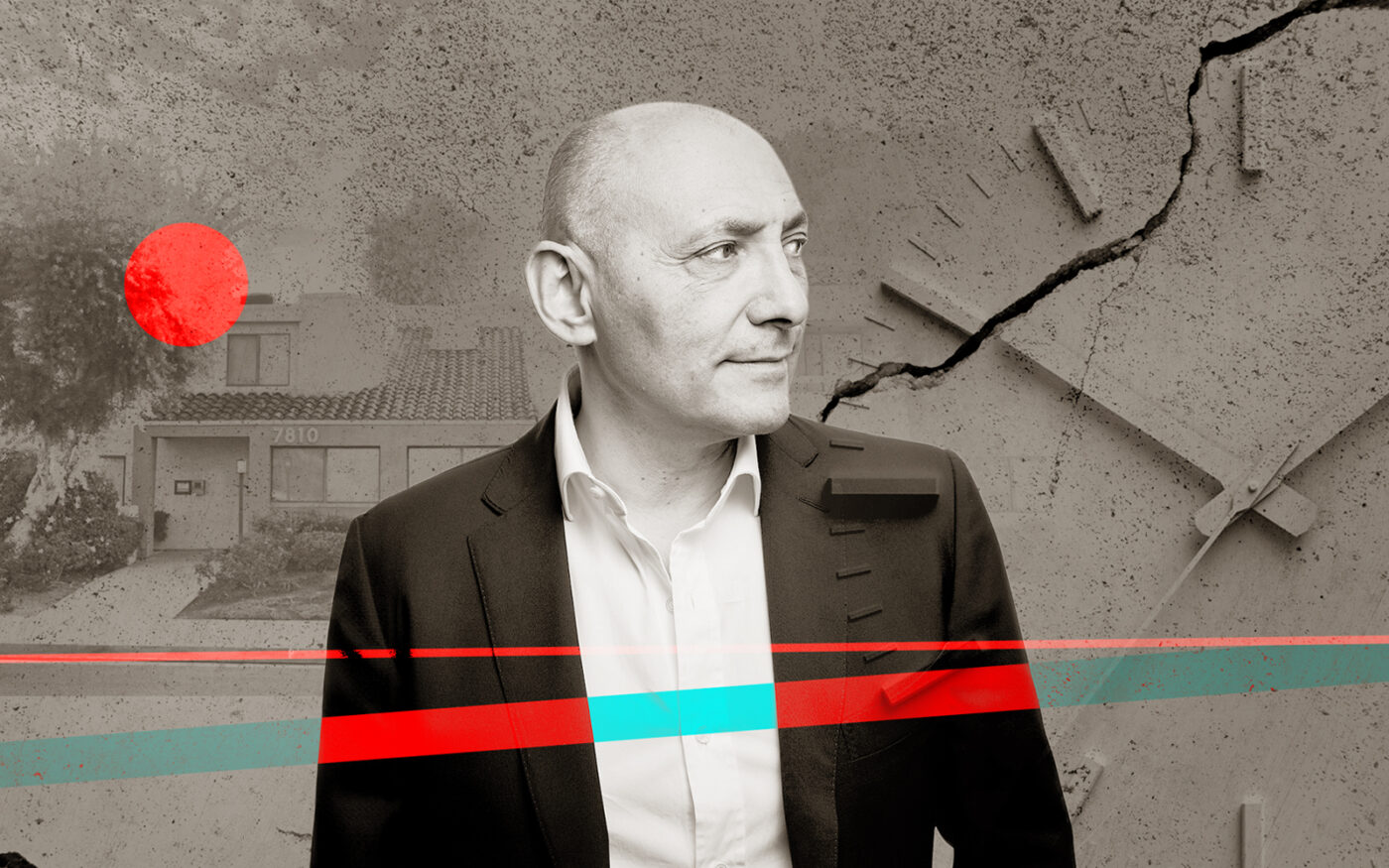Neil Shekhter once held some of the most coveted land in the U.S.
He had apartments in Santa Monica and Beverly Grove, where one-bedroom units now average nearly $4,000 a month. And he owned land in Santa Monica that Tishman Speyer, the New York investment giant that counts Rockefeller Center among its holdings, paid more than $18 million an acre to buy.
Now, most of what he had is gone.
Shekhter, 60, who emigrated from the former Soviet Union when he was 17 and started his career as a taxi driver, spent the last three decades assembling a portfolio of more than 2,400 apartments across L.A. County through his firm WS Communities and an affiliate of NMS Properties.
In piecing together his portfolio, Shekhter grew accustomed to legal challenges. There was a lawsuit in 2014 brought by a business partner over a $400 million portfolio. More recently, when he submitted applications to build thousands of units in Santa Monica in 2022, he was among the first to test and challenge builders remedy — a contentious California legal provision that lets developers bypass zoning approvals in cities without a state-approved housing plan, as long as a project allocates 20 percent of its units for affordable housing.
But for Shekhter, losing properties is a new challenge.
Last month, WS Communities ceded control of more than half of its portfolio to lenders through deeds-in-lieu of foreclosure.
Shekhter’s financial woes have not ended there. After saddling himself and his firm with billions in debt over the past five years, the IOUs have become too much to pay off — a problem many developers and landlords are facing in light of high interest rates.
At least four banks have sued entities controlled either by Shekhter or his sons, Alexander, Alan and Adam, claiming default on millions of dollars worth of business loans and other acquisition financing. On many, court records show Shekhter and his sons had personal recourse guarantees, meaning that in case of default, the bank can come after their personal assets.
“If he was cash-heavy, he’d be sitting on a gold mine of multifamily.”
Shekhter and Scott Walter, WS Communities CEO, both declined to comment for this story.
But people close to the firm’s financial troubles said interest rate hikes were devastating.
“If he was cash-heavy, he’d be sitting on a gold mine of multifamily,” said a source familiar with Shekhter’s situation. “Time got away.”
But today, with more than $1 billion wiped clean, the question is: Can Shekhter stage another comeback?
“To be a good developer, you have to be an optimist. It is hard not to look back,” Shekhter told The Real Deal in 2020. “When you work so hard and lose it all, it’s not that easy.”
The debt pivot
In 2010, following the Great Recession, Shekhter owned a number of development sites but needed help financing construction. He found equity from AEW, a real estate investment manager, which became a partner in nine buildings across L.A.
Four years later, Shekhter tried to buy AEW out of their partnership, triggering two years of litigation.
“The banks told me: ‘Until this litigation is over, we’re not going to do business with you because you’ve been alleged to have done all these things. We don’t know if you did it or not, but until it’s resolved, we can’t do any business,’” Shekhter said in the 2020 interview.
In 2016, the court sided with AEW — he lost all nine buildings. Shekhter pivoted to trying to “do business the normal way, by being able to get normal loans, by dealing with normal banks,” he said in the same interview.
Shekhter’s largest source of financing was never a traditional bank. It was Madison Realty Capital, a private equity and debt fund known for dishing out expensive rescue loans and unafraid of foreclosures.
In 2019, Madison was about a year into having a presence on the West Coast, handing out baby cash — a $20 million loan on a Beverly Hills condo project — at first.
Madison went all in on Shekhter.
The lender gave him, his wife, Margot, and his firm a $345 million loan tied to seven properties, records show. A year later, Madison loaned another $150 million to Shekhter and his entities, covering another six properties.

Shekhter tacked on more in 2021. Madison’s loan package on the seven properties was upsized to $475 million, according to loan documents. And Madison upsized the other loan to $287 million. Hankey Capital also joined in as a lender.
WSC, without an equity partner, had found debt partners in Madison and Hankey, ones together willing to hand over more than $1.2 billion tied to nearly 30 parcels over the course of three years, according to a TRD analysis.
Much of WSC’s debt with Madison and Hankey was floating-rate, like some of the business loans, according to records and a source familiar with the matter.
When the Federal Reserve hiked rates in 2022 — at the fastest pace since the 1980s — many multifamily owners with floating-rate debt raced to keep up with soaring monthly payments. On some of the debt with Madison, the interest rate ballooned from 7.5 percent to 12 percent from 2021 through the end of 2022.
Shekhter defaulted on the loans with Madison late last year. The lender, comfortable with foreclosing and taking over assets, wasn’t willing to extend the debt, according to a source familiar with the matter.
Madison also did not want to force a fire sale.
“The higher interest rate environment and cost to construct — it didn’t serve anyone to sell these at a discount,” the source said. “They are really good sites.”
The best solution for Madison was to sign deeds-in-lieu on 20 of the parcels, taking over the sites and avoiding formal foreclosure proceedings. It also wiped $1.1 billion from Shekhter’s debt books, leaving him and his family to focus on other liabilities.
Stacks on stacks
After AEW won its court case, Shekhter not only pivoted to unconventional lenders, but also focused on making his firm a family business.
His wife has frequently signed deeds, and his sons are often managers of his limited-liability companies.
Being in the family business also means having a willingness to take on debt.
In September 2022, Shekhter needed cash for three apartment complexes in Santa Monica: 1007 Lincoln Boulevard, 1038 10th Street and 1516 Stanford Street.
The Bank of Southern California agreed to provide a loan — not a standard acquisition loan but a business loan, court records show. The Shekhter-controlled entities that owned the three properties scored access to a $16.2 million credit line, good for three years.
Shekhter obtained the loan just days after the Federal Reserve hiked rates for the fifth time in 2022. The interest rate started at 7.25 percent, higher than the average mortgage rate at the time, and ballooned to 9.5 percent a year later.
The three properties were also already drowning in debt — each was put up as part of the collateral on $150 million in liability from Madison Realty, records show.
WSC promised to pay it back. Shekhter’s sons each signed unlimited personal guarantees with recourse, according to court documents. If the businesses could not pay it back, the Shekhter boys would have to.
“To be a good developer, you have to be an optimist. It is hard not to look back. When you work so hard and lose it all, it’s not that easy.”
Adam, Alexander and Alan Shekhter “failed and refused, and continue to fail and refuse, to pay the sums due and owing to plaintiff, in breach of said Guaranty,” the Bank of Southern California said in a lawsuit filed last year. Attorneys for the Shekhters have not yet answered the complaint.
Loans are either recourse or nonrecourse. Real estate players often take out nonrecourse loans — in the case of a default, lenders can only go after the physical asset. With unlimited recourse loans, lenders can go after personal assets, too.
But the Shekhters were used to these sorts of business loans. Though they’re from “normal banks,” the risk in the event of default is still there.
In 2019, the three Shekhter sons scored a $2.4 million, 10-year business loan from First Choice Bank, also with unlimited personal guarantees, court records show. The Shekhters failed to make payments on that loan in September, October and November, according to a complaint filed last month.
Alan, Adam and Alexander had also failed to provide tax returns for 2022 and failed to certify that two trusts tied to their names had maintained a net worth of $20 million.
“In my world, the way I was raised, shake hands, and to me, that’s a deal. In this country, sadly enough with all the lawyers, people create documents 5 to 10 inches thick,” Shekhter said in 2020. “And they can bury a couple words in there that will change your whole life. And people don’t realize until it hits them.”
Thanks to the lawsuit from the Bank of Southern California, Shekhter and his family lost 1007 Lincoln Boulevard, 1038 10th Street and 1516 Stanford Street late last year to a receiver tasked with leasing up the properties and selling them to recover unpaid debt.
With the receiverships, Shekhter only has a handful of properties left in his portfolio. But from what he’s said in the past, he’s always been determined to stay in real estate.
The question remains whether he can.
“I always saved money and invested it in real estate because I felt that as you get older, you pay off your loan and retire,” he said in 2020. “That was kind of the dream.”
This story has been corrected to reflect that Madison Realty only signed deeds-in-lieu on 20 parcels and that its two initial loans to Shekhter were then upsized.
